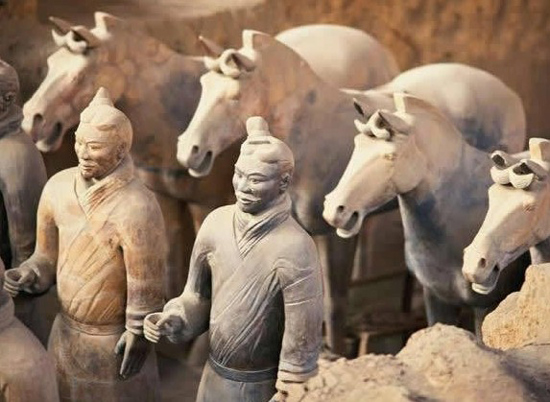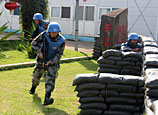
 |
| (File photo) |
New system can shield national relics from damage by pollution
Even the Terracotta Warriors are feeling the effects of China's choking air pollution.
Chinese scientists have found that the indoor environment where the Terracotta Warriors are housed could cause them to deteriorate, prompting some scientists to raise the idea of using air curtain technology to help control the environment in the pits.
In early February, Gu Zhaolin, a professor at Xi'an Jiaotong University, and his team published a paper in Environmental Science and Technology, a prominent journal under the American Chemical Society, which showed the results of a research project sponsored by the Ministry of Science and Technology to develop a system to maintain a comfortable environment for the Terracotta Warriors.
An air curtain looks similar to household air conditioners. The machines eject a powerful airflow, which forms a sheer air layer that separates the environment on the two sides.
"When you are shopping in the supermarket, you might have seen those freezers without a cover. The reason that the temperature in the freezers is lower than the outside is that they have the air curtain, which you cannot see but does exist, to prevent the exchange of air and heat," Gu said.
"The air curtain is just like other barriers, for example a glass wall. It can prevent more than 90 percent of the pollutants in the air from entering the pits," he said.
Installing an air curtain inside the pits could protect the Terracotta Warriors and other pottery relics from further damage, Gu told China Daily.
Major environmental factors affecting the relics include temperature, humidity, air pollutants, lighting, dust and mold.
Ma Tao, deputy director of the Shaanxi Provincial Institute for the Conservation of Cultural Heritage, told China Daily that the pollutants from visitors and atmospheric pollution could penetrate the enclosed hall and cause the relics to deteriorate. Ma is a co-author of the paper published in Environmental Science and Technology.
"For example, automobile exhaust includes pollutants such as hydrocarbon compounds, nitrogen oxides and sulfur dioxide, and when it penetrates the Terracotta Warriors, it decomposes the pigments on the surface, then it deposits and continues to erode the pottery," Ma said.
Earlier studies on the Terracotta Warriors on display show that humidity and dust are the most obvious factors affecting the ancient relics, Ma said.
Most of the more than 1,500 Terracotta Warriors that have been excavated have lost their color, and being exposed to the air will worsen the deterioration, he said.

















 Village teacher with his back basket
Village teacher with his back basket


![]()
